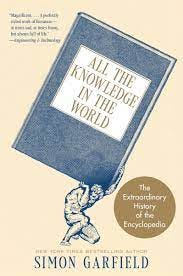Welcome to the new/old link party! I’ve been doing these monthly roundups for almost as long as I’ve been blogging (a long time), and I’m happy to be bringing the tradition to my new Substack home. Past linkfests (as they were known) are here.
I’ve almost finished listening to Simon Garfield’s All the Knowledge in the World: The Extraordinary History of the Encyclopedia (2023), and I now feel both smarter and happier. (Thank you, Libby, the free public-library app!) Garfield, a British journalist—it’s “Encyclopaedia” in the UK title—takes us from ancient Greece to the era of digital domination, with excursions into door-to-door sales, an 11,000-page Chinese encyclopedia that was too big to be printed, and the brief reign of encyclopedic CD-ROMs. (Did you know that Microsoft’s code name for its Encarta encyclopedia was “Gandalf”?) The narrator, Tim Bentinck, does a good job with accents (American, regional British, French, Dutch) and imparts just the right wry tone. I was jolted, though, by his mispronunciation of Nobel Prize-winning physicist Richard Feynman’s surname: He rhymes it with “plain man” instead of “wine man.” He could have looked it up in—oh, I dunno—Wikipedia.
In case you missed them, a couple of my recent stories for Medium:
LinkedIn is actually fun now (no, really!)
X/Twitter’s new tagline is a flaming disaster
Lard, schmaltz, suet, and other names for fat. (Mike Pope)
FUBAR, SUSFU, and 17 other glorious “military screw-up acronyms,” by fellow Substacker Jack Shepherd. (Subscribe!)
On the FIR (For Immediate Release) podcast: AI rewrote 50 well-known corporate slogans, including Apple’s legendary “Think Different.” (ht Sallie Goetsch)
Last month I wrote about the newish practice of naming heatwaves in the manner of hurricanes. (It started a couple of years ago.) Now comes news that a meteorologist in Portland, Oregon, is naming heatwaves after big bad oil companies. (Kottke)
Mark Prus of NameFlash schools us on the naming lesson from the Pac-12 fiasco.
Should we rename obesity? (Medscape Nurses)
“‘Sex work’ is becoming a widespread euphemism for ‘prostitution,’” writes Pamela Paul in a New York Times op-ed. “But make no mistake: ‘Sex work’ is hardly a sign of liberation.” (Gift link. I’m aware that Pamela Paul’s opinions tend to annoy a lot of people, but I think her argument here is worth considering: “To help people hurt by the sex trade, we need to call it like it is.”)
Why were unmarried women called “spinsters”? Hint: spinning was involved. (Useless Etymology)
A fabulously entertaining history of corporate presentations, from slideshows (born in 1948) to PowerPoint. (MIT Review, via Harry McCracken on Mastodon.) Tangent: I only recently learned that Harry McCracken, Fast Company’s global technology editor, is the brother of Elizabeth McCracken, novelist. (I loved The Hero of This Book.) Elizabeth McCracken writes a Substack newsletter with an excellent name—Release McCracken—and beautifully written content about, among other things, swimming in Texas.
I’ve been tracking the rise and spread of novel -ify coinages (snackify, drinkify, freshification) and brand names (Spotify et al.) for a long time now. So naturally I inhale-ified Lauren Michele Jackson’s “The ‘-ification’ of Everything” (New Yorker, not paywalled). An excerpt: “A recent piece in Esquire considers the ‘merch-ification of book publishing,’ and the Daily Beast, writing on the Netflix docuseries ‘Harry & Meghan,’ declared the ‘Gen Z-ification of the royal couple.’ Vox has lately published articles on the ‘old man-ification’ of television, the ‘Easter egg-ification’ of celebrity beefs, and the ‘You’re doing it wrong’-ification’ of TikTok influencers.” In contrast with these ephemera, Jackson writes, is the staying power of Cory Doctorow’s coinage “enshittification,” which I’ve written about, too.
One more reason not to use funky spelling in your company name. (Domain Name Wire)
Donut burgers with a side of butt fries. (Arnold Zwicky)
Lane Greene, The Economist’s language guy, explains why you probably have an accent in a foreign language, even if you’re fluent. (YouTube)
How hip-hop changed the English language: the stories behind five words—dope, woke, cake, wildin’, and ghost—that show rap’s linguistic influence. (New York Times Magazine)
A housekeeping note: I’m taking next week off. Happy reading, and see you in September.




